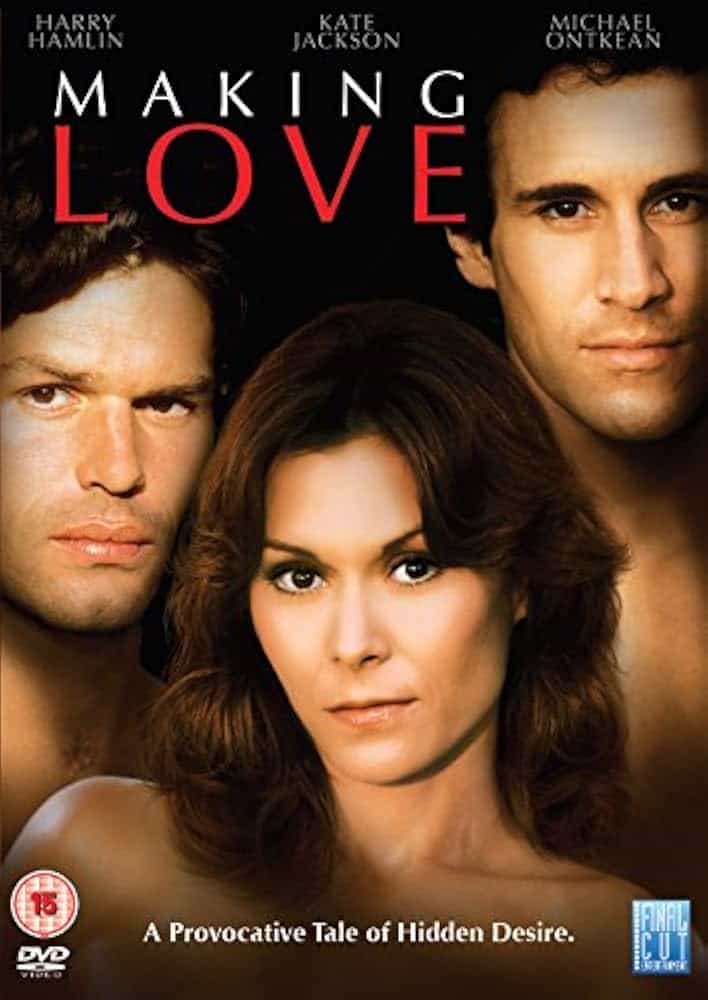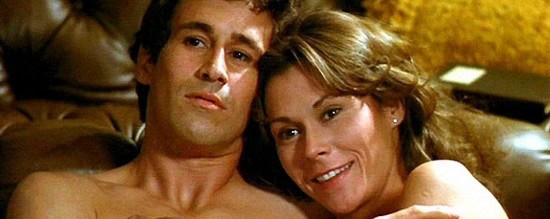Making Love

Recap
A straight couple, deeply in love, must come to terms with their relationship, when one of them is able to admit to himself that he is gay.
Review
Over the past 30 days, the media team has been looking at several movies that had historical significance in the representation of the LGBTQ+ community. The articles have been leading up to one of the most important and significant films. Making Love is one of the very first mainstream movies, starring well known actors, to portray gay relationships as being just as valid as heterosexual ones.
Successful Los Angeles doctor, Zach Elliott (Michael Ontkean), is married to an up-and-coming television producer Claire (Kate Jackson). They seem to have an idyllic life, sharing a love for Gilbert and Sullivan musicals and the poetry of Rupert Brooke. But their seemingly perfect life is quietly unraveling as Zach grapples with his suppressed sexuality. Zach begins to explore his desires, at first just going to gay bars and cruising spots, but never actually able to go through with any physical contact, but that changes when he meets and forms a connection with openly gay novelist Bart (Harry Hamlin), Zach is forced to confront the truth about himself. Bart has a fear of commitment, but as their bond strengthens, both men must face the reality of who they really are. Claire, sensing something is wrong, presses Zach to tell her the truth. The film follows the emotional journey of the three characters as they navigate the fallout of Zach’s coming out, exploring themes of love, identity, and the personal cost of living authentically.

Released by 20th Century Fox on February 12,1982, Making Love was one of the first mainstream Hollywood films to seriously address homosexuality and coming out from a sympathetic, character-driven perspective. Directed by Arthur Hiller and written by Barry Sandler and A. Scott Berg, the film received mixed reviews upon release—some critics praised its bravery and emotional depth, while others felt it was overly sanitized or cautious. In The Homosexualization of America, gay rights advocate Dennis Altman observed that among the American films released that year with homosexual themes, Making Love stood out as the sole example willing to present same-sex relationships as equally legitimate as heterosexual ones; however, he noted that the cautious approach to marketing the film reflected how gradual meaningful progress would likely be. The box office of the first weekend seemed promising and distribution was expanded from 300 to 700 venues, but viewership dropped sharply, and the film ended up losing quite a bit of money. Regardless, Making Love has since earned a place in film history for being a trailblazer in LGBTQ+ representation. At a time when positive depictions of gay men in cinema were rare, the film stood out for treating its characters with empathy and dignity, making it a significant early step toward broader inclusion in Hollywood storytelling.

On a personal note, coming out, even today (or possibly especially today), is a very difficult thing, and for many people the expectation to conform is too strong and they repress their desires and marry someone, whom they deeply love, but who will never be able to satisfy them. I was very much Zach in this film. I was engaged to be married and luckily, we never got to the altar. Making Love is partially responsible for me staying in the closet far longer than I should have. I was 13 years old, and the backlash from people I knew about seeing two men kissing on screen, scarred me, and like Zach in the film, caused me to repress these urges. I did not see the film when it came out, and it would be years after I eventually came out to watch, what in today’s world would seem like a very tame cautiously told tale. But in the early 80s, at least around my household, the film was scandalous. Technically, I think the movie is well done, I love Kate Jackson (my favorite Angel) and Harry Hamlin (a Greek myth in his own right). Michael Ontkean did a great job as Zach, but he didn’t feel gay. I don’t mean in a stereotypical sense, but he doesn’t manifest a certain vibe as well as Harry Hamlin does, this is a minor hinderance to the story but may add to the feeling some critics had of the film feeling too “cautious”. The script and dialogue, for the most part feel authentic, and I liked the format of the movie, with Claire and Bart both narrating, as if being interviewed about the events after the fact, centering around their shared love for Zach. It is a bittersweet film that shows both the joy and pain that can be societal pressure not allowing you to be your authentic self. The ending is both happy and sad, as the leads all get what they want, but there is loss associated with it as well. Overall, the film is one of the most positive gay portrayals to come out in the early 80s, with some strong performances by the entire cast and a beautiful story that shines a true and positive light on same sex relationships.
Final Thoughts
A film that graciously tackles the subject of coming out and being true to oneself, even if that hurts those you love the most. It is a sweet, sad and joyful film, and one of the first to not demonize homosexuality.
LGBTQ+ Pride 2025: Making Love
- Writing - 8/108/10
- Storyline - 9/109/10
- Acting - 8/108/10
- Music - 9/109/10
- Production - 9/109/10





